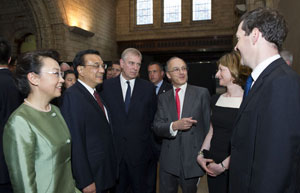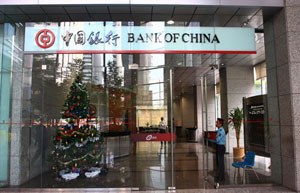"As China stands poised to become the world's largest economy and continues to expand its economic influence, we believe that robust and well-functioning capital markets are essential both on the mainland and offshore," Lake says.
Huo Rongrong, head of China and renminbi business development at HSBC EMEA, says the initiative shows that the UK is thinking ahead in realizing that the next step to engage with renminbi activities is to link onshore and offshore activities together.
"The purpose is to break the barriers so capital can flow into China and out of China more effectively and more investment activities can be done. Another focus is to help China develop a functional and sophisticated capital market, which is such an important funding channel to fuel future economic growth."
Another example that demonstrates the UK government's commitment to lead and to innovate under the wider renminbi internationalization initiative is a memorandum of understanding signed in June between the UK's Export Credits Guarantee Department, HSBC, and a leading Chinese company, to support long-term renminbi financing.
Under the agreement, the three parties will work toward finding a workable structure for funding large, long-term equipment or projects in renminbi.
Huo says this initiative shows that the UK government has officially approved the renminbi as a long-term funding option, meaning that it is ready to provide guarantees to further boost import and export activities.
"Previously, they would back the dollar, they would back the euro, but now the UK government is ready to back the renminbi. Lots of commitment and effort have been demonstrated."
Globally, renminbi use in international trade finance grew to 8.66 percent in October, from just 1.89 percent in January 2012, the Society for Worldwide Interbank Financial Telecommunication says.
This milestone made the renminbi the second most used currency for trade finance internationally, behind the US dollar, which has a share of 81.08 percent. About 18 percent of China's global trade is now denominated in renminbi, compared with less than 1 percent nearly four years ago.
At the same time, there are signs that the renminbi is moving toward becoming a global reserve currency, beyond just being a trade currency.
Hua Jingdong, vice-president and treasurer of the International Finance Corporation, says the UK government's announcement that it is issuing a renminbi sovereign bond is a milestone on the renminbi's journey to becoming a reserve currency.
"For them to tap into a new currency diversifies their funding resources. It gives them another avenue of funding. So it makes a lot of sense."
The renminbi's prominence as a reserve currency is growing, and this is partly reflected by the fact many central banks have invested in the International Finance Corporation's offshore yuan bonds, Hua says
But the timescale of the renminbi becoming a reserve currency will depend on how quickly the Chinese government liberalizes its capital account controls on the renminbi, he says.
|
 |
 |
|
|
Bank of China gets yuan mandate in Frankfurt |
